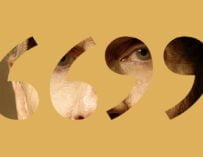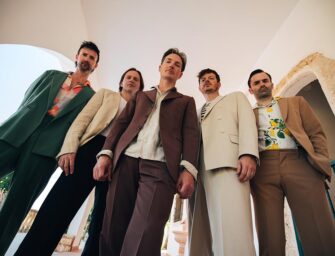One half of husband/wife duo Westberg reflects on a long and winding career to share some sage words of advice
First of all, a quick caveat. This advice is for people who are already hopelessly enmeshed in a life of music, who have decided that they have no plan B, who have the privilege of sleeping on couches or sharing rooms or living at their parents’ house, i.e. me when I was 25 years old. I don’t think I’d be able to write advice for anyone else. For those of you in this situation, good luck. My path towards an actual music career was not a straight line. I quit a couple of times before I finally found my way to selling more than 10 albums a month.
First published in our Autumn 2020 issue
1. Collaborate as Much as Possible/Find your Niche
In my early 20s, I was locked in my head. I wanted to make such complicated music! I didn’t know how to go about it at all, but I did anyway. One of the things I did was to create a bunch of electronic loops to practice the saxophone over. I’d do it for hours and hours with no real goal. Somehow, during this period, I managed to show these to a drummer I met named Deantoni Parks. That simple act changed my life.
He said, “Speed that up,” and then recorded a bunch of blistering takes in Pro Tools, which then became a project we called Astroid Power-Up! I learned how to produce electronic music out of the necessity of completing what we had started.
After that, I became a little more comfortable with the idea of reacting to other people and forging a common goal out of our collective love of music. You don’t know who might galvanize you into creating something that becomes extremely important for your craft and career. However, you’ll never get there unless you get in the room with someone and try to open yourself up to their ideas.
There are cases of people doing 100% of musical projects by themselves, but they are rare and are getting rarer. Even if you’re a lone genius who can do it all yourself, you’re probably going to need a mastering engineer.
2. Contact Music Business Professional for Answers
When I was starting out, I had no idea how the business side of things worked. I simply made music for myself, and then started trying to make it for other people. I ended up in a situation where I had produced several tracks for a young artist and then didn’t know how to go about getting paid for it.
I asked some other producers and they gave me some great advice on how to write up a first production contract and what I could expect. Even more importantly, I received the number of an entertainment lawyer. I was terrified of contacting this guy because I assumed that he would need $500 per hour right out of the gate, to address my issues. What I didn’t realize was that some lawyers will give advice for free, or even help negotiate a small contract, to secure clients later on.
The music business, I then learned, is a game of long-term relationships. The lawyer gave me some simple advice, which worked. He told me to walk away from another terrible deal, and then finally helped me negotiate a contract, which turned out to be extremely important, for which I paid him. I gained some confidence in the contract side of things.
Later on, with a different lawyer, I finally got paid for something that came out in the real world, and had to negotiate another production deal and then a publishing contract. I could not believe how complicated everything was – points vs. percentages, publishing vs writing, composition vs master recording, the different types of royalties, the different streams of income – each of these took me a long time to understand, both in concept and in what it meant in terms of money. I’m not going to attempt to even give an overview here – books have been written about it. Beyond the books, however, everything changes all the time in the music industry. It’s essential to stay in touch with people whose business it is to stay updated with the shifting landscape.
3. Develop a Routine
Ok, younger me, now we’re back to the fun part. No more of the scary stuff.
Committing to being a professional musician is a daunting prospect. Not only are we always reminded of the shifting nature of how money is or isn’t made, but the examples of success can seem unattainable. In many cases, we only learn about a musician at the very peak of their career, which may have taken them decades to achieve. Sometimes, tucked in the bio is a line or two – “Kanye did five beats a day for three summers,” “The Beatles played four-hour sets in Hamburg for 48 days straight” – that’s much more accurate to the daily lives of musicians I’ve known, especially when they are starting out.
So how do you get there, or at least somewhere? How do you even assess the skills you need to learn? You really won’t know until you dive in, and you might be scared to dive in unless you have a plan. This is where a good routine comes in.
In my opinion, a good routine is one that fuels your creativity. It’s highly personalized, attentive to your personal goals, and allows you to relax and spend a good amount of time being purely creative.
4. Set Goals and Act on Them
GOALS: If you already know your goals, great. If you don’t, you’ll want to figure them out. Some kind of meditative activity where your brain is free to explore at its own pace can help. I’ve used walking, freewriting, playing video games, doing household chores, drinking while doing all of the above… just pay attention to how you feel, get away from the primary tools of your craft for a second. Don’t be afraid to be still and quiet and wait. If it’s there, it’ll come to you.
Once you define a goal, a whole world of “work to be done” will open up before you. You’ll have strengths and weaknesses related to the task. Some will be physical and rote in nature, some will be exploratory, some will involve research, some will be trial and error. Here’s where we get…
HIGHLY PERSONALIZED: This is where you begin to make a schedule. Break your goal down into its parts. For instance, if you want to “be a better guitar player so you can write better country songs”, you might need to do things like work on alternate picking, chord voicings, research some guitar tones, play along with songs you love, and eventually write songs (or in this case, instrumentals). The idea is to take these parts and spend a little bit of time individually on them each day. I do an hour for each thing – I get my coffee or whatever, start a timer, dive in, and then stop when the timer stops. Start with 15 minutes for super frustrating things – alternate picking is super frustrating at first!
Another part of this being highly personalized is that you want to check in with yourself and do the appropriate task for your mental state. Sometimes you’ll be fried or sleepy, that’s a good time to do rote tasks like the alternate picking example. Sometimes you’ll be full of ideas and can’t be bothered to do anything repetitive. Those are great times to attempt to actually go for it and achieve the goal – in our example, it’d be writing a song with an awesome guitar part. You might find that certain times of the day are more suited to some tasks more than others. Personally, I would do all the rote stuff in the morning, take a break around lunch, and then feel up to more complicated tasks in the afternoon, take another break, and then be my most creative from around 8 pm til midnight. It might change, too. Just keep emotionally “checked in.” If things become too frustrating or you drift into the weeds and get anxious, it’s time for a break. Creativity is like a well that slowly fills itself, and sometimes you just need to wait. And that’s where we talk about…

Westberg’s Scott Bruzenak III
RELAXATION: There’s a tremendous video of John Cleese called “How To Be Creative” where he drops an unparalleled knowledge bomb – the most creative people are the ones who are most able to relax and enter into a childlike mode of “play.” It may seem contradictory from what I’m saying about goal-directed behavior and scheduling, but all of the time spent really has one big goal – to maximize your time spent being creative. You gently sit yourself down with your tools, block off as much time as you can spare, do a little exploration, and then just begin to play with the material.
Getting in the state of “play” can be different for everyone, and it might be weird stuff. Charles Dickens would comb his hair constantly while he wrote. Schiller, the poet who wrote the text for Beethoven’s Ode To Joy, needed to have the smell of rotting apples in order to write. Personally, while I’m producing a song, I need to work on it for a while and then go for a walk. It’s not because I’m frustrated; it’s because it’s my ritual of relaxation. I’ll be fully immersed in all aspects of the song, I’ll have the topline memorized and know the voicing of each chord and be able to model the entire thing in my head. The walk begins – I let my mind go blank – and then after about five to ten minutes, ideas will organically begin popping up. I’ll hear reharmonizations, melodies, beats, I’ll have wild lateral ideas. I make sure to remember them all, then come home and try to do everything in 20 minutes.
I wish I had understood what walking does to my brain when I was younger. I would have been more efficient with my time. Instead, I would spend hours and hours locked to the computer chasing the “flow state”. It wasn’t all bad, I learned how to do a lot, but it wasn’t ideal.
5. Your Time is More Valuable Than Your Gear
I can’t claim credit for this idea. There was an individual at electro-music.com named Kassen who dropped that piece of wisdom in relation to the rampant “Gear Acquisition Syndrome” that tends to occur in electronic music circles. There’s no mystery why – electronic music gear has been undergoing a continuous revolution since the 60s, and it’s only accelerated in the last 10 years. The tools are insane. There are software recreations of unique pieces of gear, like everything the Beatles ever recorded with, and they’re very well modeled. There are amazing recreations of $8,000 synths that cost less than $100 and take up a humble few hundred MB whereas the originals weigh 200 pounds and take up half your bedroom studio. Then the other side of the equation is that platinum records are made, to this day, by teenagers on cheap laptops with cracked versions of Fruity Loops and a $9 per month
Splice membership.
The point is that you don’t need any of it. Charlie Parker played one of his most famous concerts on a plastic saxophone. It worked and became part of music history because of how well he used it. Synths, DAWs, and sample sets are no different. In fact, if you get too much stuff, you can be paralyzed with the volume of decisions you need to make and get fatigued.
It’s much more valuable to commit to a limited amount of tools and then get back to squeezing beauty out of it. Your depth of knowledge and creativity make any tool you use absolutely unique to you, and maybe someday someone will look back in awe and say, “How in the heck did they figure that out?!”
Scott Bruzenak III is one half of husband/wife duo Westberg. Find out more at facebook.com/westbergofficial
First published in our Autumn 2020 issue




































Related Articles